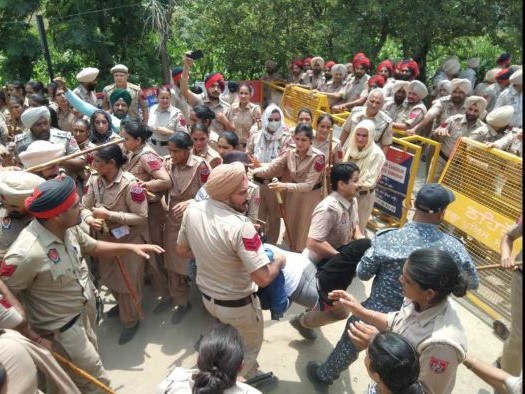 More than 1,000 assistant professors and librarians staged a peaceful protest outside Punjab Chief Minister Bhagwant Mann’s residence in Sangrur, demanding answers about their pending review petition in the Supreme Court. The demonstration, which lasted over six hours, took a disturbing turn when protesters attempted to move forward and were met with what they describe as inappropriate police conduct.
More than 1,000 assistant professors and librarians staged a peaceful protest outside Punjab Chief Minister Bhagwant Mann’s residence in Sangrur, demanding answers about their pending review petition in the Supreme Court. The demonstration, which lasted over six hours, took a disturbing turn when protesters attempted to move forward and were met with what they describe as inappropriate police conduct.
The protesting faculty members, part of the #1158AssistantProfessorAndLibrarians group, were seeking clarification on why their review petition challenging the Supreme Court’s July 2025 decision wasn’t filed. The Supreme Court had quashed their appointments in July, ruling there was “total arbitrariness” in their selection process that violated University Grants Commission norms. These appointments were originally announced ahead of the 2022 assembly elections but were later challenged by candidates alleging irregularities in the merit-based selection.
Serious Allegations of Police Misconduct Against Female Faculty
The situation escalated dramatically when male police officers allegedly engaged in inappropriate physical conduct with female professors during the protest. According to the demonstrators, male officers placed their hands on female faculty members’ chests while female police officers remained passive observers. When protesters questioned this behavior, they report that officers mocked their professional identity and academic credentials.
Adding to concerns about accountability, the protesting faculty alleged that police officers were not wearing name plates, making it impossible to identify those responsible for the misconduct. The lack of proper identification raises questions about transparency and accountability in police operations during public demonstrations.
Growing Frustration Over Government Response
The protest represents mounting frustration among the affected faculty members over what they perceive as government indifference to their plight. Despite repeated demonstrations in Sangrur, including previous clashes with police, the protesters claim that no government official has engaged with them or addressed their concerns about the review petition.
The faculty members have made it clear that their protest is not merely about employment but about justice and proper legal process. Their demand for information about the review petition suggests they believe proper legal procedures were not followed in their case.
Direct Warning to Chief Minister
In a strongly worded statement, the protesting professors issued a direct challenge to Chief Minister Bhagwant Mann, warning that “if we walk out, we’ll drag your ‘KURSI’ (chair) out too.” This unprecedented language from academic professionals underscores the depth of their frustration and their determination to continue their struggle despite alleged police intimidation.
The warning reflects the professors’ confidence that they will not be deterred by what they describe as attempts to frighten them. Their message suggests they view their cause as having the potential to impact the stability of the current government.
Wider Implications for Academic Freedom
This incident raises broader questions about the treatment of academic professionals in Punjab and the government’s handling of employment disputes in the education sector. The allegations of police misconduct, particularly against female faculty members, highlight concerns about the protection of fundamental rights during peaceful protests.
The ongoing dispute also reflects the complex challenges facing Punjab’s higher education system, where political decisions about appointments have led to legal challenges and created uncertainty for hundreds of qualified professionals. The Supreme Court’s intervention in July 2025 was meant to ensure proper procedures, but the aftermath has created a new set of problems for both the affected faculty and the state government.
Skip to content
India Top New